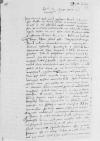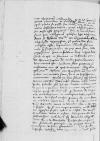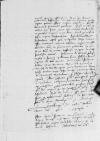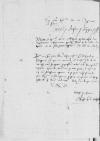Letter #1367
Cornelis DE SCHEPPER & Godschalk ERICKSEN (SASSENKERLE) to Ioannes DANTISCUSLüneburg, 1535-10-27
English register:
Because he had to travel to the meeting of the Wendish towns, De Schepper decided not to send his last letter from Bruges, but to take it with him and send it from Bremen or Lüneburg to Gdańsk. He describes his journey by ship from Sluis to Harlingen in Frisia. In Dordrecht he was joined by Godtschalk Ericksen, who was still weak after his illness. From Harlingen they travelled to Eastern Frisia, and they reached Emden after an arduous journey, due to heavy storms. They were hospitably received by the counts Enno and Johann of East Frisia, both old friends of Dantiscus and De Schepper. Exhausted by the war with Balthasar Oomkens von Esens, the counts have allied themselves with the Duke of Guelders [Charles II]. They were pleased to learn that Dantiscus was in good health and they frequently recalled their friendship. De Schepper should convey their greetings to him. Upon their arrival in Bremen they met Wolfgang von Affenstein, envoy for Elector Palatine Ludwig V to the Wendish towns, in order to urge them to peace. He also welcomed the news about Dantiscus, and wanted to be recommended to him. Dantiscus must realise that he still has many friends.
With Affenstein they travelled to Lüneburg where the meeting of the Wendish towns had been summoned. No delegates from Gdańsk were present. They had an interview with the mayor of Lübeck, Nicolaus Brömse, and with Anton von Stiten, a member of the Lübeck town council, in which they declared that they had a mandate to settle the disputes, and mentioned that the city of Gdańsk supports the Dutch and that the other subjects of the Emperor [Charles V] have the support of Gdańsk, in accordance with the navigation agreement between the Netherlands and Gdańsk. They have informed the citizens of Gdańsk of these proposals and requested them to send delegates to Brabant and Flanders, and to offer possible suggestions for a solution to the conflict, which is the express will of the Queen [Mary of Hungary]. De Schepper will also entrust this present letter to the messenger to Gdańsk.
They urged the representatives of the Wendish towns to seek ways to a lasting peace in Denmark. They informed them that Count Palatine Fridrich II has married the Emperor's niece [Dorothea], rightful heir of King Christian II of Denmark, and stressed that he will stand on his rights to the Danish throne. He has the support of the Emperor, who prefers nonetheless that Fridrich should enforce his rights in a peaceful manner. Wolfgang von Affenstein confirmed the stance of his prince. The Wendish towns took no position, leaving the decision to Lübeck. The Lübeck delegates postponed any decision until after the conference on the pacification of Denmark, which is to be held in Hamburg within two weeks, in the presence of the Elector of Saxony [Georg von Wettin], the Duke of Holstein [Christian III], the Duke of Lüneburg [Ernst of Brauschweig-Lüneburg], Duke Albrecht [of Mecklenburg-Schwerin] and his brother Heinrich. De Schepper will convey this information to his employers. He regrets the rejection of a negotiated solution and fears the consequences for those who prefer war to peace. He emphasises the talents and merits of Fridrich. The Emperor will not tolerate his authority being thus scorned; as a result the future could prove much worse than the past.
In Münster the captured king of the Anabaptists, Jan van Leyden, will soon be locked alive in an iron cage and exposed to birds of prey and cold. His fellow instigators of the rebellion, Bernthard Knipperdollinck and Bernhard Krechting, will accompany him to hell.
The King of England [Henry VIII] had several innocent men executed, including the Cardinal of Rochester [John Fisher] and Thomas More, because they refused to recognise him as the head of the Anglican church and to approve his incestuous marriage. De Schepper was informed of these executions by Eustache Chapuys, the imperial ambassador in England. The rumoured attempts at an agreement between the Kings of England and France are confounded by the good fortune of the Emperor. Heinrich Treusch von Buttlar, who was sent together with De Schepper and Ericksen to the Wendish towns as envoy of King [Ferdinand I], became ill and had to stay behind in Braunschweig.
Postscript 1: De Schepper will spend the winter at the court of Queen Mary, unless he is summoned by the Emperor in Naples. Godtschalck Ericksen will probably return to the Emperor.
Postscript 2: He sends Dantiscus a report on the African expedition.
Addition by Godtschalck Ericksen: He has nothing to add to the detailed report given by De Schepper on behalf of both of them. He recommends himself to Dantiscus, and assures him of his willingness to render him any possible service.
| received [1535]-12-22 Manuscript sources:
Early printed source materials:
Prints:
| ||||||||||||||||||||||||||||||||||||||||||||||
Text & apparatus & commentary Plain text Text & commentary Text & apparatus
Reverendissimo in Christo Patri et Domino, domino
Reverendissime in Christo Pater, domine honorandissime.
Post cf.  UB H 154, f. 142v vivere.
UB H 154, f. 142v vivere.
Quin et cum
Cum
De reliquo ms 2 negotio,
ms 1 negot[...] paper damaged⌈negotioms 2 negotio,
ms 1 negot[...] paper damaged⌉
 UB H 154, f. 143r
hoc habe. Admonuimus civitates, ut cogitarent de talibus mediis, quae concernunt pacificationem
UB H 154, f. 143r
hoc habe. Admonuimus civitates, ut cogitarent de talibus mediis, quae concernunt pacificationem  UB H 154, f. 143v
inter Christianos introducendae, quod ea est hominum caecitas quorundam orig. quorumdam⌈quorundamquorundam orig. quorumdam⌉, ut adversus written over m⌈mss written over m⌉ Deum, ius et aequum putent se posse sua tueri neque ad bona media descendere velint, quasi aliquid violentum diu possit esse perpetuum. Quin et non tam stupidi sumus, quin intelligamus, quorsum haec vergant. Sane si
UB H 154, f. 143v
inter Christianos introducendae, quod ea est hominum caecitas quorundam orig. quorumdam⌈quorundamquorundam orig. quorumdam⌉, ut adversus written over m⌈mss written over m⌉ Deum, ius et aequum putent se posse sua tueri neque ad bona media descendere velint, quasi aliquid violentum diu possit esse perpetuum. Quin et non tam stupidi sumus, quin intelligamus, quorsum haec vergant. Sane si
ms 1 excita[...] hidden by binding⌈excitatams 2 excitata,
ms 1 excita[...] hidden by binding⌉ aliquando expergefiat, id quod video fieri necessum esse, experientur nonnulli suo cum malo, quam sinistro consilio ea, quae pacis sunt, bello postposuerint. Sunt in
Rerum novarum neque apud nos neque hic quicquam est aliud, nisi quod
ms 1 solu[...] paper damaged⌈solusms 2 solus,
ms 1 solu[...] paper damaged⌉ et incomitatus vadat ad inferos, adiungentur
 UB H 154, f. 144r
mortis genere affici fecit, et in his
UB H 154, f. 144r
mortis genere affici fecit, et in his
Et bene vale, Domine et amice honorandissime.
Dat(ae) or Dat(um)⌈Dat(ae)Dat(ae) or Dat(um)⌉
Ex animo Reverendissimae Dominationis Vestrae inservitor et filius
Postscript No. 1:
Hanc hiemem orig. hyemem⌈hiememhiemem orig. hyemem⌉ spero me transacturum in aula
Postscript No. 2:
Mitto ad Reverendissimam Dominationem Vestram aliquot quaterniones de expeditione Aphricana, quamquam satis puto eadem illa Reverendissimae Dominationi Vestrae sat nota esse, in omnem tamen eventum.
[2]Reverendissime in Christo Pater, domine observandissime.
Cum dominus
Datum
Vestrae Reverendissimae orig. Reverendissime⌈ReverendissimaeReverendissimae orig. Reverendissime⌉ Dominationis deditissimus inservitor





